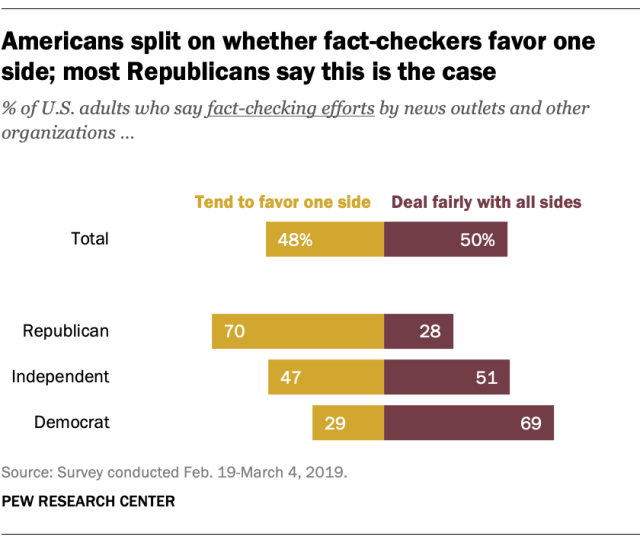☀️ Happy Thursday! The Briefing is your guide to the world of news and information. Sign up here!
In today’s email:
- Featured story: Silicon Valley’s shifting approach toward Trump’s social media accounts
- In other news: Conspiracy theories spread after Trump assassination attempt
- Looking ahead: Former DCist staff to launch a new local news site for Washington
- Chart of the week: Republicans more likely than Democrats to say fact-checkers tend to favor one side
🔥 Featured story
Meta last week announced plans to remove restrictions on former President Donald Trump’s Instagram and Facebook accounts after both were reinstated in January 2023. The company said it made this change to give candidates equal treatment during the 2024 election.
When Trump was originally suspended from Facebook following the Capitol riots on Jan. 6, 2021, Americans were evenly split on whether he should be permanently banned from social media. Members of the two major political parties had drastically different views: In an April 2021 survey, 81% of Democrats and Democratic-leaning independents said Trump’s accounts should be permanently banned from social media, compared with 11% of Republicans and GOP leaners.
Trump was permanently suspended from Twitter for nearly two years, but Elon Musk reinstated his account after buying the platform. Musk officially endorsed Trump for president on the site (now called X) last weekend, part of a broader trend of Silicon Valley figures more openly supporting Trump.
Democrats and Republicans who regularly get news on X are divided in their views of the platform, according to a 2024 Center survey. For example, eight-in-ten Democrats who regularly get news on X say the platform influences what news stories they see there a lot or some, while 55% of their Republican counterparts say the same.
📌 In other news
- Conspiracy theories spread among conservatives and liberals after Trump assassination attempt
- Shares in Trump’s media company surge after assassination attempt
- A look at how news outlets covered Trump’s VP pick
- Editorial union for Mashable, Lifehacker and PC Mag successfully bargains for protections against the outlets’ use of generative AI
- Jury finds Ozy Media CEO Carlos Watson guilty of defrauding investors
- How University of Florida student journalists are investigating the state’s most powerful elected officials
- Former Wall Street Journal reporter says she lost her job over role with Hong Kong’s leading journalist group
📅 Looking ahead
A group of journalists is starting a nonprofit newsroom – called the 51st – to cover community news in Washington, D.C., after the local news site they previously worked for was shut down by WAMU earlier this year. The 51st aims to offer hyperlocal news, with a focus on topics such as the cost of living in D.C., navigation of city services and accountability reporting.
According to a 2024 Pew Research Center survey, two-thirds of U.S. adults say they follow local news at least somewhat closely, a decline of 12 percentage points since 2016. However, the vast majority of Americans (85%) see local news outlets as at least somewhat important to the well-being of their local community, including 44% who say they are extremely or very important.
📊 Chart of the week
In light of a new fact-checking partnership between PBS and PolitiFact, this week’s chart from a 2019 survey shows that Americans at the time were split in their views of fact-checkers.
Half said that fact-checking efforts by news outlets and other organizations tend to deal fairly with all sides, while about the same share (48%) said they tend to favor one side. There is a large partisan split: Seven-in-ten Republicans said that fact-checkers tend to favor one side, compared with only about three-in-ten Democrats (29%).

👋 That’s all for this week.
The Briefing is compiled by Pew Research Center staff, including Naomi Forman-Katz, Jacob Liedke, Sarah Naseer, Christopher St. Aubin, Luxuan Wang and Emily Tomasik. It is edited by Katerina Eva Matsa, Michael Lipka and Mark Jurkowitz, and copy edited by Anna Jackson.
Do you like this newsletter? Email us at journalism@pewresearch.org or fill out this two-question survey to tell us what you think.